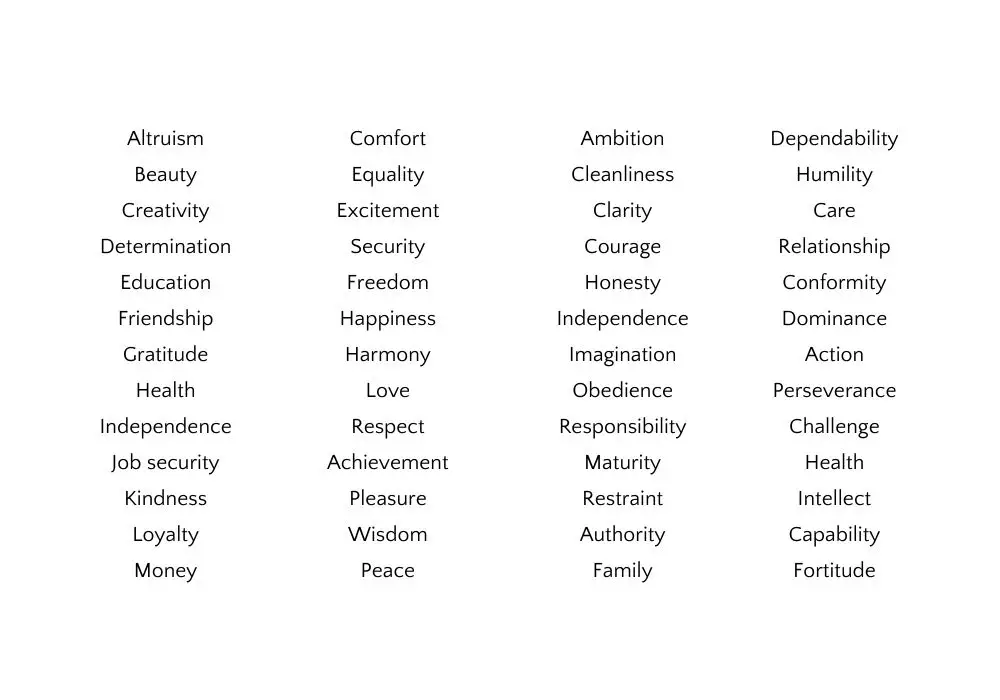Values are important in life because they influence our behavior, personality, attitude, thoughts, and decision-making.
Although our values are partly shaped by society, there is a part of us that remains the same, even as we experience changes within ourselves, our relationships with others, and our interactions with the world.
Values have a purpose in our lives, which is to guide our actions so they are in alignment with our beliefs. They also connect us to the core of who we are.
In this blog post, I will go over why values are they're important, what values are, how they are formed, how they benefit you, and how to make a list of your own personal core values.

The importance of values.
Values are important because they guide you and give you a greater sense of direction and purpose in life.
Why you need to define your values.
It is important to define what your values are they can help you focus on the things that matter most to you in life. Also, if someone or something came around to challenge your values, you'll be less likely to doubt or second guess yourself.
When you define your values, you have to be honest with yourself. This requires awareness, patience, and self-compassion.
A personal lesson learned about the importance of values.
When I was pregnant with my first child, I came down with a terrible cold and I did not want to take any drugs (even over-the-counter ones) because of my baby. After much research, I came across an article for natural home remedies.
The article suggested an unconventional approach to help get rid of my cold without any medications. The process involved drinking hot orange juice and doing 15-minute steam baths every day until my cold disappeared.
Though I thought it was weird, I wanted to try it because my top value was my family and I wanted to do everything to protect my son's health. The "treatment" worked and it was a small but significant lesson learned on the importance of values.
How values are formed.
Values are changeable because they are influenced by society and the people we are closest to. They are formed from the time we are born, but we get to choose the values that resonate with us at any given point and situation in our life that would be most useful to us.
Values can come from:
Family: spouse, parents, siblings, grandparents, extended relatives.
Peers: friends, colleagues, acquaintances.
Authority figures: teachers, employers, religious leaders.
Society: neighbors, community, environment.
Media: influencers, people with power or clout, celebrities.
Writing: books, literature, fiction, non-fiction.
"To me, I think the core values that will help create the world that we're striving to live in are constant." - Maya Harris
How values benefit you.
We need values because they guide our behavior, attitude, personality, and choices. Here are some reasons why values are important in our lives and how they are beneficial to your health and well-being.
Values help you discover your passions and purpose in life.
Your purpose in life is the reason why you got up this morning. When they are aligned with your core values, your passions and purpose in life give you direction and meaning. It can help you during times that are challenging.
Aligning your values with your purpose in life can help you live a life that is meaningful to you. For example, if your top value is creativity, you can find the things in life that bring out your creativity and this, in turn, helps you live a more purposeful life.
Values contribute to your happiness and success.
People with a high sense of their values can articulate themselves well and their values align with their personality. They generally have healthier self-esteem than people who don't have a good sense of what their values are.
People who have a lower sense of what their values are, tend to have lower self-esteem than people who have higher levels. They are also more likely to have values that are in opposition to their personality, place blame on others, and have greater internal tension.
Those who prioritize eudaimonic values like friendship, family, and community are generally happier than those who prioritize extrinsic values like money, power, educational attainment, work, health, and leisure.
Values help you make decisions and prioritize.
Values help you make decisions by prioritizing what is most important in your life. These are the things that will have a direct and immediate impact on your life, like choosing a career or starting a family.
Knowing your core values enables you to stay focused on the things that bring meaning, joy, and happiness to your life.
The key to genuine happiness is in our hands. To think this way is to discover the essential values of kindness, brotherly love, and altruism. The more cleary we see the benefits of these values, the more we will seek to reject; anything that opposes them; in this way we will be able to bring about inner transformation. - HH the 14th Dalai Lama
Questions to ask yourself to discover your values.
Self-inquiry is a way to help you dig down deep so you can find your own personal core values.
What makes me excited? This is the reason why you get up every morning and gives you meaning and purpose in life.
Who do I look up to? This person has qualities that you want to possess or you admire.
Why did I choose my significant other? You may not always agree on everything, but there are some attributes that you share with your life partner.
Why did I choose my career? Your career choice is usually an indicator of your core values.
What would I be doing if time and money were not a factor? This could be something you've always dreamed of being or doing; or something that you already know about but don't have the means right now to pursue.
When did I face adversity or a challenge? This can be something that you overcame and learned from that was difficult and challenging.
"There are three values: Feel good, be good, and do good." - Harbhajan Singh Yogi
Types and categories of values.
There are so many values in the world that differ across race, nationality, culture, religion, creed, etc.
The following is a list of values according to different types of categorizing systems that I hope will simplify the different types and categories of values. There is a table below this list to use as a quick reference for yourself. Though not complete, you can use the following values that resonate with or inspire you.
Examples of values:
Intrinsic or personal values.
These are valuable not because of what they can bring, but simply for what they are.
Beauty
Artistic expression
Happiness
Universal values
These are principles that people across the world are expected to abide by.
Peace
Dignity
Value of human life
Human values
These values are fundamental to human nature to make life smooth and happy.
Friendly nature
Good behavior
Safety
Religious values
This is a person's belief that acts as a higher power or guide for what is good and what makes a person happy.
Piety
Faith
Devotion
Moral values
These enable us to follow the correct and right path
Honesty
Integrity
Loyalty
Spiritual values
Principles that allow a person to follow philosophical beliefs and thoughts.
Non-violence
Presence
Compassion
Political values
These values pertain to a person's feeling of patriotism.
Patriotism
National unity
Democracy
Social Values
These values make it possible for people to live together and for each other.
Worry for others
Care for others
Cooperation
Educational values
This allows for the growth of a person's knowledge and understanding.
Curiosity
Creativity
Open-mindedness
Aesthetic values
This is an appreciation for beauty and beautiful things.
Elegance
Art
Music
Scientific values
This allows us to test, analyze, and verify data, knowledge, etc.
Knowledge
Objectivity
Meticulousness
Table of values

Writing your own personal core values.
Make a list of your top core values. Describe any thoughts or feelings that you associate with each value. Now rank your values, placing the most important one at the top.
After you've written your personal core values, you can reassess them periodically. The position of each value may change as you transition through each phase of your life. You might even add a new value or take one away, depending on where you are at in your life.
Writing out your personal core values is important because it provides a reference point for your purpose in life. Your values and purpose in life work together to create a life that is happier and more meaningful to you.
"Your core values are the deeply held beliefs that authentically describe your soul." - John C. Maxwell
Before you go.
Now that you know why values are important in life, the next step is to find out who you are at the core so that you can define what your personal core values are.
Here are some very helpful articles to help you get to know yourself better so you can start creating your own list of personal core values to prioritize the things that matter most to you:
9 ways to find your true identity and discover who you are.
How to know yourself better in 10 different ways.
100 Self-discovery journal prompts to connect more deeply with yourself.
If you have any feedback or questions about values or anything that has to do with getting to know yourself on a deeper level, let me know in the comments!

I am very happy with this article and how it was explained.
Thank you Esther. I appreciate you taking the time to read it :).